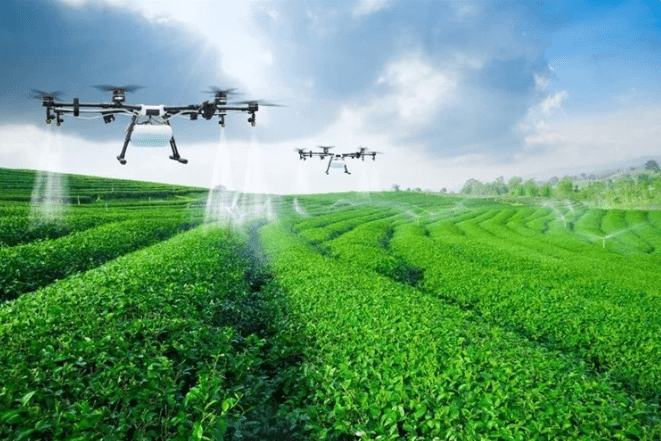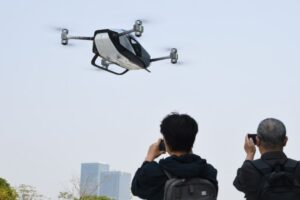
Artificial intelligence is revolutionizing crop management through the use of advanced monitoring systems. These systems use sensors and drones equipped with cameras and image recognition technology to collect data on soil conditions, plant health, and the presence of pests.
AI algorithms analyze this data in real-time, providing farmers with accurate and detailed information about the status of their crops. This constant monitoring capability allows farmers to make informed and timely decisions, thereby improving efficiency and productivity.
Precision farming is another area where artificial intelligence is making a big difference. Smart irrigation systems, for example, use data collected by soil moisture sensors and weather forecasts to determine the exact amount of water plants need. This not only optimizes water use, but also reduces waste and associated costs.
Additionally, AI can help identify best fertilization practices, adjusting fertilizer amounts and types based on specific crop needs and soil conditions. This precise approach ensures optimal plant growth while minimizing environmental impact.
Additionally, AI can predict and alert about potential diseases and problems before they become serious threats, enabling preventative interventions that protect crop health and ensure better long-term yields.
Detection and control of pests
Pest detection and control is another major challenge in agriculture, and artificial intelligence offers innovative solutions to address it. AI systems can identify and classify different types of pests through images and data collected by drones and sensors.
Once identified, AI can recommend specific control methods that are more effective and less damaging to the environment. This includes the use of biological pesticides and integrated pest management techniques, which combine different strategies to keep pest populations below damaging levels. Artificial intelligence is also playing a crucial role in improving farming practices through precision agriculture.
This approach uses geospatial data, sensors, and data analytics to manage fields more efficiently. For example, farmers can use yield maps to identify areas of their fields that need more attention or are more productive. With this information, they can adjust their farming practices to maximize yields and reduce unnecessary inputs. AI-enabled precision agriculture allows farmers to use their resources more efficiently and sustainably.
Improved decision making and harvest automation
Another notable fact is that artificial intelligence is improving decision-making in agriculture through predictive analytics. Machine learning algorithms can analyze large amounts of historical and current data to predict future crop yields, market trends, and weather conditions.
This predictive capability enables farmers to plan ahead and make informed decisions that can improve profitability and reduce risks. For example, they can decide which crops to plant based on market demand predictions and expected weather conditions, thereby optimizing their income and minimizing losses.
In the field of harvesting, this technology is automating many tasks that were traditionally labor-intensive. AI-equipped harvesting robots can identify and pick fruits and vegetables with astonishing accuracy and speed. These robots use computer vision and deep learning algorithms to detect fruit ripeness and determine the best time for harvesting.
This automation not only reduces reliance on labor, but also ensures that produce is harvested at the optimum point of ripeness, improving its quality and shelf life.
Data management and supply chain
Data management is another area where artificial intelligence is having a significant impact on agriculture. Farmers generate vast amounts of data from a variety of sources, such as field sensors, drones, satellite images and farm machinery.
AI can efficiently process and analyse this data, providing valuable insights that can be used to improve farming practices. For example, data analytics can reveal patterns and trends that are not apparent to the naked eye, helping farmers identify problems and opportunities for improvement. The ability to make data-driven decisions is crucial to increasing the efficiency and sustainability of farming.
Artificial intelligence is also playing a major role in improving the agricultural supply chain. AI algorithms can optimize the logistics and distribution of agricultural products, reducing costs and improving efficiency. For example, they can predict demand for products in different markets and adjust transportation routes accordingly.
Not only does this reduce food waste, but it also ensures that products reach consumers in the best possible condition. Improving the supply chain is essential to meet the growing demand for food in a sustainable and efficient manner.
Innovation in sustainable crops and practices
On the other hand, artificial intelligence is driving innovation in agriculture by developing new crop varieties. Machine learning algorithms can analyze large amounts of genomic data to identify genetic traits that contribute to disease resistance, tolerance to extreme weather conditions, and crop yield.
This information can be used to develop new crop varieties that are more resilient and productive. AI-powered biotechnology is helping to create crops that can better adapt to changing climate conditions and meet future food demands. In addition, artificial intelligence is facilitating sustainable agriculture by helping farmers adopt more environmentally friendly practices.

AI systems can provide personalized recommendations on farming practices that minimize environmental impact, such as crop rotation, direct seeding, and the use of mulch. These practices can improve soil health, reduce erosion, and increase biodiversity. Adopting sustainable farming practices is crucial to protecting natural resources and ensuring long-term food production.
In agricultural research, artificial intelligence is accelerating the discovery of new solutions to farming challenges. Scientists can use AI algorithms to analyze large experimental data sets and find patterns that may not be apparent to the naked eye.
This can lead to new discoveries in areas such as disease resistance, improved food quality and resource efficiency. Collaboration between artificial intelligence and agricultural research is driving innovation and the development of new technologies that can transform agriculture.

Grupo Ruiz is a business conglomerate based in the province of Tucumán, Argentina. Founded in 1994 with the creation of Paramérica SA, in a decade it has positioned itself as a world leader in the export of black beans and lemons.
Source: https://reporteasia.com/economia/desarrollo-sostenible/2024/07/01/inteligencia-artificial-agricultura-innovaciones-sostenibilidad/
